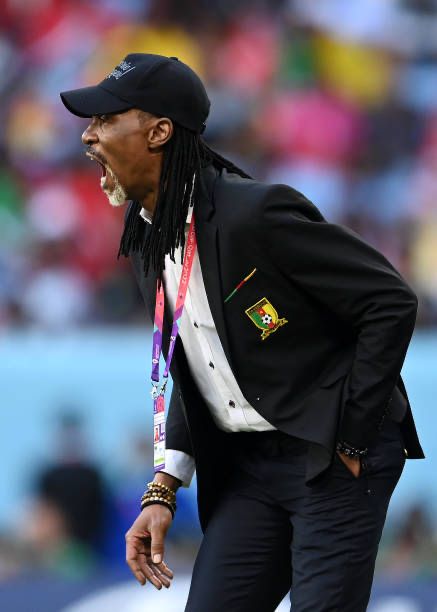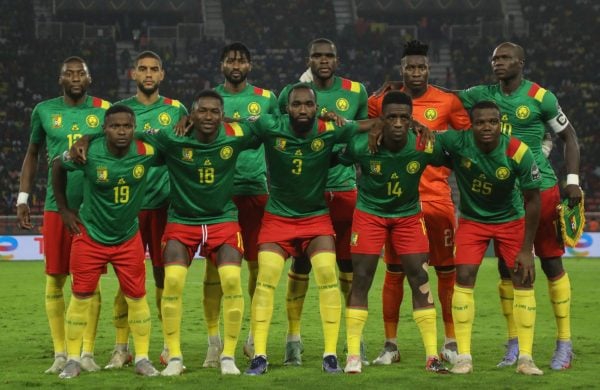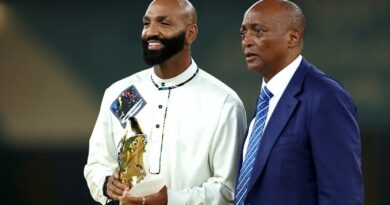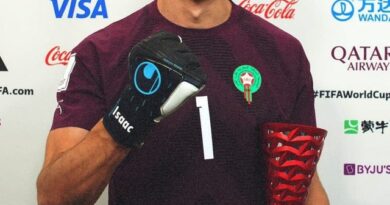Binewa Team Profile: Cameroon at TotalEnergies AFCON 2023
By Muambo E. Lyonga
Cameroon is a country in Central Africa. It shares boundaries with Nigeria to the west and north, Chad to the northeast, the Central African Republic to the east, and Equatorial Guinea, Gabon and the Republic of the Congo to the south. Its coastline lies on the Bight of Biafra, part of the Gulf of Guinea and the Atlantic Ocean. Its nearly 27 million people speak 250 native languages, in addition to the two official languages, English and French.
Early inhabitants of the territory included the Sao civilisation around Lake Chad, and the Baka hunter-gatherers in the southeastern rainforest. Portuguese explorers reached the coast in the 15th century and named the area Rio dos Camarões (River of Shrimps), which became Cameroon in English. Fulani soldiers founded the Adamawa Emirate in the north in the 19th century, and various ethnic groups of the west and northwest established powerful chiefdoms and fondoms. Cameroon’s capital city is Yaoundé.
Cameroon has made a record eight appearances in the FIFA World Cup by an African country and will be making their 20th appearance at the Africa Cup of Nations starting from 1970 in Sudan. The five time champions will be challenging for a sixth crown in Côte d’Ivoire, where they won their first title 40 years ago.

Team Bio
Cameroon had to wait till the seventh edition to make their AFCON debut in Sudan. Under the tutelage of coach Raymond Fobété they travelled to Sudan full of hope. Only two players from their squad for the tournament came from abroad, Jean Koum(Grenoble) and Gabriel Abossolo(RFC Paris-Neuilly. Cameroon also attempted to call up Joseph Yegba Maya of Olympique Marseille to the squad, but Marseille’s demands for financial compensation were too high.
They were drawn in Group A with Côte d’Ivoire, hosts Sudan and 1962 winners Ethiopia. In their first ever AFCON game against Côte d’Ivoire, Laurent Pokou quickly scored a brace for the Ivorians. Forward Jean Koum became the first Cameroonian player ever to score a goal in the AFCON with his 57th minute goal against Côte d’Ivoire. He further endeared himself into Cameroon football folklore with a second goal in the game at the 66th minute. Jean Baptiste Ndoga was also on target at the 60th minute to hand Cameroon their first ever AFCON win at the first time of asking. In their second game against Ethiopia, Mengistu Worku scored twice for the 1962 champions but Cameroon still got the win thanks to goals from Jean Marie Tsebo, Jean Manga Onguene and Jean Baptiste Ndoga with his second goal of the tournament. Unfortunately for the Indomitable Lions they lost their third game against Sudan. Nasr Eddin Abbas opened the scoring for the hosts before Jean Marie Tsebo with his second of the tournament equalized for Cameroon at the 34th minute. Hasab El-Rasoul Omer Ali scored Sudan’s winner at the 60th minute. With Côte d’Ivoire, Sudan and Cameroon all on four points, captain Pascal Baylon Owona and his teammates were eliminated on goal difference despite a brilliant start in their AFCON journey with two wins in three games.
Cameroon had the honour to host the next tournament in their second participation. They were drawn in Group A with Kenya, Mali and Togo. Cameroon opened their tournament with a 2-1 win over Kenya. Jean-Baptiste Ndoga opened the scoring for Cameroon at the 7th minute before Paul Gaston Ndongo doubled their advantage at the 20th. Kenya pulled one back through Jonathan Niva. Now on the books of US Valenciennes, Joseph Yebga Maya was available for Cameroon, he scored Cameroon’s first goal in their 2-0 win over Togo in their second game. Captain Emmanuel Mve Elemva scored Cameroon’s second. Mali proved to be a tough knot to crack in Cameroon’s final group game. Cheick Fantamady Keita gave them the lead at the 43rd minute, before Cameroon leveled tally at the 67th through defender Francois Ndoumbe Léa.
In the semifinals against Congo Brazzaville, Noel Minga Tchibinda break Cameroon hearts with the lone goal in Congo’s 1-0 win. Cameroon had to settle for the classification game against Zaire and showed no mercy. Jean Paul Akono scored Cameroon’s first from the spot before Paul Gaston N’Dongo with his second of the tournament scored Cameroon’s second. Norbert Owona, Philippe Mouthe and a second of the tournament for Jean Baptiste Ndoga gave Cameroon a 5-2 win in a game that saw seven first half goals.
Cameroon failed to qualify for the next four tournaments and only returned in 1982 in Libya. They were drawn in Group A with hosts Libya, three time winners and eventual champions Ghana and Tunisia. Grégoire Mbida was on target for Cameroon in their 1-1 draw with Tunisia in their opening game. Two goalless draws with Ghana and Libya followed and Cameroon were shown the door at the group stage.
It was fourth time lucky for Cameroon in Côte d’Ivoire in 1984. They were drawn in Group A with two time winners Egypt, hosts Côte d’Ivoire and Togo. Taher Abouzeid scored the lone goal of the game in Egypt’s 1-0 win in Cameroon’s opener. Cameroon bounced back from that loss with a 4-1 bashing of Togo. Bonaventure Djonkep, a brace from captain Theophile Abega and goal from Ibrahim Aoudou gave Cameroon the win, making Rafiou Moutairou’s goal inconsequential. Hosts Côte d’Ivoire were stunned in front of their belligerent home supporters. Bonaventure Djonkep with his second of the tournament and Roger Milla scored for Cameroon in a comfortable 2-0 win.
The semifinal against Algeria went down to the wire. Both teams failed to score in regular and extra time and the game was decided in a shootout. Emmanuel Kunde, Ernest Ebongue, Ibrahim Aoudou, Joseph Antoine Bell and Ndoumbe Léa made sure with their spot kicks while Mahmoud Guendouz missed for Algeria to give Cameroon 5-4 win.
1980 winners Nigeria were Cameroon’s opponents in the final. Mudashiru Babatunde Lawal opened the scoring for the Super Eagles at the 10th minute, but Cameroon kept their calm and rallied to turn the game around. René N’Djeya, Theophile Abega and Ernest Ebongue handed Cameroon a 3-1 win and a first AFCON triumph. Theophile Abega was the competition’s best player while Joseph Antoine Bell was Best goalkeeper.
Egypt hosted the 1986 tournament and Cameroon came in with the tag of defending champions. They were drawn in Group B with 1976 winners Morocco, Algeria and Zambia. Cameroon’s first game was against Zambia, Roger Milla with his first of the tournament gave Cameroon the lead. Michael Chabala equalized for Zambia but Louis Paul Mfede restored Cameroon’s lead. Kalusha Bwalya got Zambia’s equalizer from the spot before Mfede with a penalty of his own gave Cameroon the win with his second of the game. Cameroon followed up with a 1-1 draw with Morocco, Abdelkrim Merry gave Morocco the lead but Albert Roger Milla equalized for Cameroon at the 89th minute. Another 3-2 win, this time against Algeria saw Cameroon through to the knockout stage. Rabah Madjer gave Algeria the lead at the 61st minute, but Andre Kana-Biyik equalized at the 66th and gave Cameroon the lead at the 70th minute. Milla with his third of the tournament scored Cameroon’s third at the 72nd before Karim Maroc pulled one back for Algeria at the 73rd, but they could not complete the comeback.
Against Côte d’Ivoire in the semifinals, Roger Milla with his fourth of the tournament handed Cameroon a place in the final in the second consecutive tournament.
Hosts Egypt were Cameroon’s opponents in the final.with 120,000 fans in the stands.
Both teams failed to score in regular and extra time and the game was decided in a nail biting shootout. Andre Kana Biyik and Grégoire Mbida missed for Cameroon, making Moustafa Abdou’s miss inconsequential as Egypt won the shootout 5-4 to claim a third AFCON trophy. Cameroon were on the AFCON podium for a third time, with Milla winning the best player and top scorer awards.
In 1988, Cameroon travelled to Morocco with the goal of reclaiming their lost crown in Egypt. The Indomitable Lions were in a transition phase with the likes of Abega, Aoudou, Sinkot, Mbida making way a younger generation of players under Frenchman Claude LeRoy. Cameroon were drawn in Group B with defending champions Egypt, 1980 winners Nigeria and Kenya. In their first game against Egypt, Milla scored the lone goal of the game. Samuel Okwaraji opened the scoring for Nigeria at the second minute in their second game, but Milla equalized for Cameroon at the 21st in a 1–1 draw. They made sure of a spot in the semifinals with a 0-0 draw with Kenya in their final group game.
In the semifinal against hosts Morocco at the Stade Mohammed V in Casablanca, Cyrille Makanaky scored Cameroon’s winner at the 78th minute a hard fought 1-0 win.
Nigeria were Cameroon’s opponents in a remake of the 1984 final. Just like in 1984, Cameroon had the last laugh with a 1-0 win thanks to a goal from the spot at the 55th minute from Emmanuel Jérôme Kunde. Cameroon were crowned African champions for the second time. Roger Milla finished joint top scorer with two goals alongside Algeria’s Lakhdar Belloumi, Côte d’Ivoire’s Abdoulaye Traoré and Egypt’s Gamal Abdelhamid. He also won the best player award for the second consecutive time. Joseph Antoine Bell was voted as Best goalkeeper.
Algeria were the hosts in 1990 and defending champions Cameroon were in Group B with Zambia, Senegal and Kenya. Cameroon lost their first game to Zambia, 1-0 thanks to a goal from Webster Chikabala at the 58th minute. Another loss followed against Senegal, 2-0 with goals from Mamadou Diallo Moussa N’Daw. The defending champions were out and had to play a game of honour against Kenya. Emmanuel Maboang Kessack saved Cameroon some pride with his brace in that 2-0 win over Kenya.
After a heroic display in the 1990 FIFA World Cup in Italy, becoming the first African nation to reach the quarterfinals, Cameroon was awaited Senegal for the 1992 AFCON with a lot of expectations. The tournament was expanded to 12 teams. Cameroon were in Group B with 1968 and 1974 winners Zaire and 1976 champions Morocco. Andre Kana-Biyik scored Cameroon’s winner against Morocco in their first game. His brother Francois Omam-Biyik scored first Cameroon in their 1-1 draw with Zaire in their next game. They booked their place in the quarterfinals with three points as group toppers.
In the quarterfinals, Cameroon played against hosts Senegal now coached by Claude LeRoy. Ernest Ebongue’s 89th minute goal silenced the Stade de l’Amitié in Dakar. Cameroon booked their place in the last four.
Eventual winners Côte d’Ivoire were Cameroon’s opponents. The game was decided in in penalties after a goalless draw in regular and extra time. Makanaky, Omam-Biyik and Bell missed their spot kicks with only Ebwelle managing to score. Côte d’Ivoire progressed to the final on a 3-1 score line in the shootout.
Friday Ekpo and Rashidi Yekini were on target for Nigeria while Maboang Kessack scored the consolatory goal for Cameroon in a 2-1 loss in the third place classification game and Cameroon settled for fourth spot.
The Indomitable Lions missed out from the 1994 tournament in Tunisia but qualified for the 1996 edition in South Africa. For the second time, a Cameroon team was led at the AFCON by a local coach, Jules Nyongha, after Raymond Fobété in 1970. They were drawn in Group A with hosts and eventual winners South Africa, three time winners Egypt and Angola. A 3-0 smashing in their opening game against South Africa was followed by a 2-1 win over Egypt. Francois Omam-Biyik from the spot and Alphonse Tchami ere on target for Cameroon. They failed to progress to the knockout stage after a 3-3 draw with Angola. Omam-Biyik and Georges Mouyémé-Elong were on target for Cameroon as well as an own-goal from Hélder Vicente.
In 1998 in Burkina Faso, Jean Manga Onguene who played and scored in Cameroon’s first AFCON participation in 1970 was the coach. Cameroon was drawn in Group A with hosts Burkina Faso, 1990 winners Algeria and Guinea. They opened their campaign with 0-1 win over Burkina Faso thanks to a goal from Alphonse Tchami. That win was followed by a 2-2 draw with Guinea. Alphonse Tchami and Pierre Wome were on target for Cameroon. Womé’s goal was Cameroon’s 50th AFCON goal and he became Cameroon’s 27th AFCON goal scorer. Cameroon sealed their place to the knockout stage with a 2-1 win over Algeria. Tchami again and Joseph Desiré Job were on target for Cameroon, while Billel Dziri got Algeria’s goal.
In the quarterfinals, Cameroon bowed out of the tournament with a 0-1 loss to the DR Congo. Jerry Tondelua Mbuilua’s 30th minute goal was enough to see off the Cameroon challenge.
In 2000 the tournament was co-hosted by Ghana and Nigeria, for the first time the AFCON was cohosted. Cameroon was drawn in Group A with hosts Ghana, 1992 winners Côte d’Ivoire and Togo. In their opening game against Ghana, Marc Vivien Foe gave Cameroon the lead at the 17th minute, but Kwame Ayew equalized for Ghana at the 58th minute and both teams settled for a share of the spoils. They secured a 3-0 win over Côte d’Ivoire with goals from Raymond Kalla, Samuel Eto’o and Patrick Mboma. Against all expectations, Cameroon lost their final group game against Togo thanks to Komi Massamasso Tchangai’s 18th minute goal. All four teams in the group finished with four points but Cameroon finished as group winners due to a better goal difference.
In the quarterfinals against Algeria, the Eto’o and Mboma duo stroke again, Eto’o with Cameroon’s first at the seventh minute and Mboma with the second at the 24th minute. Abdelhafid Tasfaout scored for Algeria at the 79th minute but Cameroon held on to their lead.
Tunisia were their semifinal opponents. Mboma with a brace and Eto’o with his third of the tournament helped Cameroon comfortably beat Tunisia 3-0.
For their third time, Cameroon had to face Nigeria in an AFCON final after 1984 and 1988. It was a far more daunting task as Nigeria were playing at home, just like in 1980 when they hosted and lifted the trophy. Eto’o again with his fourth of the tournament gave Cameroon the lead at the 26th minute before Mboma with his fourth too doubled their advantage. Nigeria showed nerves of steel, Raphael Ndukwe Chukwu, before half time and Jay Jay Okocha two minutes after resumption leveled the game. It was dragged to a shootout in which Cameroon prevailed. Foe missed his spot kick for Cameroon but so did Nwakwo Kanu and Victor Ikpeba for Nigeria. For the third time Cameroon were crowned champions and for the third time they beat Nigeria in the final. Lauren Etame-Mayer was voted Best player.
In 2002 in Mali, Cameroon as defending champions had a vintaged performance. They dominated the tournament head and shoulders. Drawn in Group C with DR Congo, Togo and Côte d’Ivoire, they earned maximum points. Patrick Mboma scored in Cameroon’s 1-0 win over DR Congo and got Cameroon’s winner in an identical 1-0 win. Mboma kept his scoring boots and netted the winner in another 1-0 win, this time over Côte d’Ivoire.
At the quarterfinals, Mboma was unstoppable with the winner again at the 62nd minute in a fourth straight 1-0 win for Cameroon.
Hosts Mali were their semifinal opponents, they showed no mercy with a 3-0 bashing. Salomon Olembe with a brace and a goal from Foé gave Cameroon the 3-0 win.
In the final against Senegal, both teams failed to score in regular and extra time. It was down to another dreaded shootout again that Cameroon prevailed. Wome and Song missed their spot kicks but Amdy Faye, El Hadj Diouf and Aliou Cissé missed for Senegal as well. Cameroon claimed their footy AFCON crown with Mboma and Olembe amongst the top scorers with three goals each while Rigobert Song got the best player award.
In 2004 in Tunisia, the defending champions failed to go beyond the quarterfinals hurdle. Drawn in Group C with 1990 winners Algeria, four time champions Egypt and Zimbabwe, Cameroon qualified for the knockout stage as group winners. A 1-1 draw Algeria thanks to a goal from the eternal Patrick Mboma was followed by an entertaining 5-3 win over Zimbabwe with Mboma scoring a hat-trick and Modeste Mbami bagging a brace. Their final group game against Egypt ended in a goalless draw.
In the quarterfinals against Nigeria, Samuel Eto’o scored his sixth AFCON goal but Nigeria had the final word with goals from Okocha and John Utaka.
Another quarterfinals exit followed in 2006 in Egypt despite a flying start in Group B with nine points out of nine. In their opening game against Angola, Samuel Eto’o took his AFCON goals tally to 10 with a hat-trick in Cameroon’s 3-1 win. He was on target again with Albert Meyong Ze in Cameroon’s 2-0 win over Togo. The Cameroon forward scored in a third straight game in Cameroon’s 2-0 win over the DR Congo. Geremi Njitap also opened his AFCON goal scoring account for Cameroon with their first goal of the game.
The quarterfinals game against Côte d’Ivoire was decided by an almost everlasting shootout after 1-1 draw in extra time. Bacary Koné scored for the Ivorians at the 92nd minute but Meyong Ze replied for Cameroon three minutes later. In the shootout, all 11 players scored an Eto’o and Drogba stepped up for the second time, both men being the undisputed leaders of the teams. Drogba made sure for Côte d’Ivoire but Eto’o failed to do same for Cameroon and Côte d’Ivoire qualified on a 12-11 score line. With five goals Eto’o was the tournament’s top scorer.
The 25th edition of the AFCON took place in Ghana. Cameroon were drawn in Group C with six time winners and defending champions Egypt, Zambia and 1970 winners Sudan. In their opening game against Egypt, Eto’o scored twice but Egypt carried the day on a 4-2 score line. The Indomitable Lions rallied and ran riots against Zambia in their second game with a 5-1 bashing. A brace from Job, goals from Geremi, Achille Emana and the inevitable Eto’o cancelled out Christopher Katongo’s goal for Zambia. Cameroon made sure of a place in the knockout stage with a 3-0 win over Sudan. Eto’o showed his class again with a brace while Muhamed Ali Alkhedr scored an own-goal to hand Cameroon the win.
In a highly entertaining quarterfinals game against Tunisia, Cameroon booked their place in the last four with a 3-2 win. Stephane Mbia Etoundi gave Cameroon the lead at the 18th minute before Geremi Njitap doubled their lead at the 27th. Tunisia fought back tooth and nails to take the game to extra time. Chaouki Ben Saada pulled a goal back for Tunisia at the 35th minute before Yassine Chikhaoui got their equalizer at the 81st minute. However it was a day to be remembered by midfielder Stephane Mbia, he got Cameroon’s win at the 93rd minute. Cameroon were through to the last four to face hosts Ghana.
In front of 40,000 spectators at the Ohene Djan Stadium in Accra, Alain Mosely N’Kong silenced the home crowd with Cameroon’s win at the 72nd minute. He became Cameroon’s 40th AFCON goal scorer with their 103rd AFCON goal.
Defending champions Egypt had cruised their way to the final and were in quest for a second straight AFCON triumph. It was the second meeting between Egypt and Cameroon at the final of the tournament after 1986 which Egypt won at home. History was to repeat itself and Egypt successfully defended their title, to become only the third team to do so after Ghana and Cameroon and claimed a record sixth title. Mohamed Aboutrika’s 76th minute goal was the difference between the two teams after an uncharacteristic error from the normally reliable Rigobert Song.
Eto’o claimed the Golden Boot for the second consecutive time with five goals.
In 2010 in Angola, in their eighth consecutive appearance in the tournament, the Indomitable Lions fell short again and were eliminated at the quarterfinals. Drawn in Group D with Gabon, Zambia and 2004 winners Tunisia, Cameroon fought their way to the knockout stage after losing to Gabon (0-1) in their first game. They recorded a vital win in their second game against Zambia. Goals from Geremi, Eto’o and Idrissou gave Cameroon a 3-2 win despite Jacob Mulenga and Christopher Katongo scoring for the Copper Bullets. The final group game against Tunisia was crucial. Amine Chermiti caught Cameroon off guard at the first minute with the curtain raiser. The ever dependable Eto’o with his record 18th and final AFCON goal equalized for Cameroon at the 47th minute. Tunisia had their noses in front again when Aurélien Chedjou scored an unfortunate own-goal, but Landry N’Guémo equalized for Cameroon. The group was finely poised with three teams on four points. Zambia and Cameroon went through on head-to-head advantage.
Defending champions Egypt proved a handful in the quarterfinals. Achille Emana with his second AFCON goal for Cameroon gave the Indomitable Lions the lead at 25th minute but Ahmed Hassan in quest of his fourth AFCON winning medal leveled the scores for Egypt at the 37th minute. The game went into extra time and Egypt got two goals through Mohamed Nagy Ismail Afash, the competition’s eventual top scorer and the evergreen Ahmed Hassan for a 3-1 win on their way to an unprecedented third consecutive AFCON triumph and record seventh title.
Cameroon failed to qualify for the next tournament and only returned in 2015 in neighboring Equatorial Guinea, where for the fifth time, their AFCON journey was ended at the Groups stage. Drawn in Group D with 1992 and eventual 2015 winners Côte d’Ivoire, 1972 runners up Mali and 1976 runners-up Guinea, Cameroon only managed two draws. Cameroon settled for a draw in their first game against Mali with a 1-1 draw thanks to a goal from Ambroise Oyongo Bitolo while Sambou Yatabaré scored for the Eagles of Mali. Another 1-1 draw followed against Guinea with a goal from Benjamin Moukandjo before Max Grandel’s goal gave Côte d’Ivoire a 1-0 win in Cameroon’s final group game.
Cameroon bounced back stronger against all expectations in another neighboring country, Gabon. Cameroon were drawn in Group A with 2013 runners-up Burkina Faso, hosts Gabon, and Guinea-Bissau. They earned a 1-1 draw in their first game against Burkina Faso thanks to a goal from captain Benjamin Moukandjo. Against Guinea-Bissau in their second game, Piqueti Djassi Brito Silva opened the scoring for the minnows, but Sebastien Siani and Michael Ngadeu-Ngadjui replied for Cameroon. A hard fought draw against host Gabon cemented Cameroon’s place to the knockout stage.
In the quarterfinals against pre-tournament favorites Senegal, Cameroon held their ground and the game was decided in penalties. Moukandjo, Oyongo, Adolphe Teikeu, Jacques Zoua and Vincent Aboubakar all scored their spot kicks for Cameroon, while Sadio Mané missed for Senegal. Cameroon were in the last four against all expectations.
They were up against four time winners Ghana. Ngadeu-Ngadjui again scored for Cameroon before the the tournament’s best player Christian Bassogog rounded up Cameroon’s fine display with a second goal at the 90+3 minute.
For a third time, Cameroon had to play against Egypt in the final. It was third time lucky for Hugo Broos and his charges. Mohamed Elneny put Egypt ahead at the 22nd minute, but Cameroon found a way back through Nicolas Nkoulou with an equalizer at the 59th minute before Aboubakar Vincent with his first ever AFCON goal gave Cameroon what looked unlikely fifth AFCON triumph. Cameroon won the AFCON with defender Michael Ngadeu-Ngadjui finishing as their top scorer with two goals.
Cameroon made their 19th AFCON appearance in Egypt in the first 24 nations tournament. They battled their way out to the knockout stage from Group F after finishing second on equal points with Ghana. Goals from Yaya Banana and Stephane Bahoken handed a comfortable 2-0 win Guinea-Bissau. Two 0-0 draws followed against Ghana and Benin respectively.
They came up against their longtime rivals Nigeria in the round of 16. Odion Ighalo gave Nigeria the lead, Stephane Bahoken equalized for Cameroon and Njie Clinton gave them the lead before the half time break. But Nigeria returned stronger in the second half and Ighalo equalized before Alexander Iwobi scored their winner as Cameroon bowed out.
Eight countries have hosted and won the AFCON with Egypt doing so three times and Ghana twice. Cameroon had the opportunity to join the Elite Club when they hosted the tournament for the second time in 33rd edition. They were drawn in Group A with 1962 hosts and winners Ethiopia, 2013 runners-up Ethiopia and Cape Verde. With just one goal in his previous three tournaments, Vincent Aboubakar was motivated by the prospect of captaining the team at home. He came to live in this one. In the first game against Burkina Faso, he bagged a brace in Cameroon’s 2-1 win despite Gustavo Sangaré’s opening goal for the Stallions. Aboubakar carried on where he left off with another brace against Ethiopia in their second game, with Toko Ekambi scoring a brace of his own in a 4-1 win. Cameroon qualified as group winners after a 1-1 draw with Cape Verde. Aboubakar scored his fifth goal of the competition but Garry Mendes Rodrigues got the equalizer for the Blue Sharks.
In the quarterfinals against Comoros, Aboubakar continued his run. He was on target 70th minute after Toko Ekambi’s opener at the 29th minute. A goal from Youssouf Yacoub M’Changama at the 81st minute for Comoros was not enough as Cameroon progressed to the quarterfinals.
The Indomitable Lions made light work of Gambia with a 2-0 win thanks to a second brace in the tournament for their other on-fire striker Karl Toko Ekambi who was now on five goals.
Their old time rivals Egypt were their semifinal opponents. They proved a hurdle too high once again for the Indomitable Lions as just like in the 1986 final, Egypt carried the day in a shootout after both teams failed to score in regular and extra time. Harold Moukoudi, James Edward Léa Siliki and Njie Clinton all missed their spot kicks.
Cameroon settled for a place in the third place classification against the other unfortunate semifinalist, Burkina Faso. Cameroon were caught napping when the Burkina Faso took a 3-0 lead into half time. Steve Yago, and own-goal from Andre Onana and a goal from Djibril Ouattara put them firmly in the lead. But Cameroon showed class in front of their home supporters and completed an unexpected comeback. First Stéphane Bahoken and two goals from Vincent Aboubakar took the game to a shootout. Aboubakar, Moumi Ngamaleu, Toko Ekambi, Kunde Malong and Oyongo Bitolo made sure from the spot while Blati Toure missed for Burkina Faso as Cameroon claimed a second third place finish in the AFCON after previously doing so in 1972 still on home soil.
The Indomitable Lions are certainly an AFCON heavyweight with nine appearances on the podium, with a total of 91 games played 45 wins, 30 draws and 16 losses, scoring 137 goals with 54 different goal scorers, and conceding 82. Only Andre Onana and Aurélien Chedjou have scored own-goals against Cameroon while Angola’s Hélder Vicente in 1996 and Sudan’s Mohamed Ali in 2008 are the only two to have scored own-goals for Cameroon.
The Journey
Cameroon were drawn in Group C, with Namibia, Burundi and Kenya. The group initially consisted of four teams: Cameroon, Kenya, Namibia and Burundi. However, on May 23, 2022, CAF announced that Kenya were disqualified from the qualifiers due to the continued suspension of the Football Kenya Federation by FIFA. The group thus went ahead with only the remaining three teams.
The teams played against each other in a home-and-away round-robin format between June 4, 2022 and September 12, 2023.
Cameroon and Namibia, the group winners and runners-up respectively, qualified for the 2023 Africa Cup of Nations
Earlier Results
Game day 1
Burundi 0-1 Cameroon
Game day 2
Cameroon 1-1 Namibia
Game day 3
Namibia 2-1 Cameroon
Game day 4
Cameroon 3-0 Burundi
Qualifications group
Cameroon 7 pts
Namibia 5 pts
Burundi 4 pt
Zimbabwe 0 pt
Players to watch
Vincent Aboubakar

Vincent Aboubakar was born on January 22, 1992 in Garoua, North Region of Cameroon. He was raised in a devout Christian family in a Muslim-majority city and his mother Maobeal Alice was a deaconess for the Evangelical Missionary Society of Cameroon. Aboubakar began his career at Cameroon’s most successful club domestically, Coton Sport of Garoua and moved to Europe in 2010 after representing Cameroon at the 2010 FIFA World Cup in South Africa as the only home based player. He played for Ligue 1 clubs Valenciennes and Lorient, totalling 109 appearances and 26 goals in French top flight. In 2014, he signed for FC Porto, where he played 125 games and scored 58 goals, winning a Primeira Liga title. He won the Turkish Süper Lig while on loan at Beşiktaşin 2017, and again in 2021. He moved to Saudi Arabia and played for Al Nassr before returning to Beşiktaş for another spell.
Aboubakar has earned 100 caps for Cameroon since his international debut in May 2010. He was part of their squads for the 2010, 2014 and 2022 FIFA World Cups, as well as the Africa Cup of Nations in 2015, 2017 and 2021. He scored the winning goal in the final of the 2017 tournament, and was the top goalscorer of the 2021 edition with eight goals. He was Cameroon’s top scorer in the qualifiers with two goals. The hopes of a nation lye on his shoulders.
Andre Frank Zambo Anguissa
28-year old former AS Fortuna and Coton Sport of Garoua midfielder Andre Frank Zambo Anguissa is Cameroon’s midfield engine. Zambo Anguissa made his international debut for the Cameroon national team in a friendly 1–0 win over Tunisia on 24 March 2017. He was part of the Cameroon team that participated in the 2017 FIFA Confederations Cup in Russia. He score his first international goal in Cameroon’s 1–1 group stage draw against Australia in the tournament.
In June 2019, Zambo Anguissa was named to Cameroon’s squad for the 2019 Africa Cup of Nations in Egypt despite turning down the chance to play in the 2017 tournament in Gabon. He would also feature at the 2021 tournament, in which Cameroon were hosts and finished in third place. He was also an integral part of the Cameroon team that took part in the 2022 FIFA World Cup in Qatar. The 2023 Italian Serie A title winner with Napoli will be one of the first names on coach Rigobert Song’s team sheets in Côte d’Ivoire.
Andre Onana Onana

Currently one of the stars in the current Cameroon team, Manchester United’s goalkeeper Andre Onana joined Barcelona’s youth system in 2010 from Samuel Eto’o’s defund Fundesport. He signed for Ajax in 2015, where he made 214 appearances and won three Dutch Eredivisie titles. Onana joined Inter Milan on a free transfer in July 2022, where he won a Coppa Italia and Supercoppa Italiana title in his sole season at the club, also reaching the Champions League final. Manchester United then signed Onana for an initial £43.8 million in 2023.
At international level, Andre has won 37 caps for Cameroon and played in the 2019 and 2021 tournaments though like Zambo Anguissa and others he too turned down the chance to play in the 2017 tournament. Since making his September 2016, Andre has never been far from controversy, like being expelled from the Lions’ den in Qatar. He is without any doubt of the world’s best goalkeepers and will be hoping to make headlines this time for the right reasons in Côte d’Ivoire.
Coach
Rigobert Song

Cameroon’s current national team coach Rigobert Song Bahanag was born on July 1, 1976 in Nkenglikok, Nyong-et-Kéllé division.
Known for his combative nature during his playing days, Song usually played as a centre-back, but could also operate at right-back. Internationally, he played at a record eight Africa Cup of Nations tournaments and served as captain in five (the ones he was not captain for were South Africa 1996, Burkina Faso 1998 and Angola 2010), a record, and holds the record of most consecutive games played in the tournament with 36 first team games. He has won two CAF Africa Cup of Nations titles in 2000 and 2002 and was voted Best Player in the 2002 tournament. With 137 appearances, Song also holds the record of the most capped player in the history of the Cameroon national team and has played in four World Cups, in 1994, 1998, 2002 and 2010
Song started his professional career with Metz after joining them from Tonnerre of Yaoundé, the club he played for before the 1994 FIFA World Cup in the USA. He helped Metz to win the Coupe de la Ligue in 1996. After appearing at the 1998 World Cup, he joined Salernitana, newly promoted to the Italian top-flight. In January 1999, he left Italy to start successive stints with Liverpool, West Ham United before moving to Germany to sign for 1. FC Köln, but after failing to hold down a first-team place, he returned to France to play for RC Lens. He stayed there until 2004, before moving on to Turkey, where he spent four years with Galatasaray, winning two Turkish Süper Lig titles and the Turkish Cup. Song then signed a contract with Trabzonspor in 2008, where he won another Turkish Cup and stayed until 2010.
Aside from French legend Zinedine Zidane, Song is the only player to have been sent off in two different World Cups, once against Brazil in 1994 and against Chile in 1998. He also holds the record as youngest player ever to be sent off in a World Cup, aged 17.
He was nicknamed “Big Chief” by Turkish fans. Despite some underwhelming performances with Cameroon’s youth national team’s, on February 28, 2022, Song was appointed coach of the Indomitable Lions, replacing Portuguese coach Toni Conceição. He guided Cameroon to the 2022 FIFA World Cup, after beating Algeria in the final hurdle. At the 2022 FIFA World Cup, his Cameroon team failed to progress from the group stage, despite becoming the first manager to guide Cameroon to their first World Cup victory since 2002 against the mighty Brazil, with a shock 1–0 win. He will like to continue writing his Cameroon and African football history with an honorable performance in Côte d’Ivoire.
2023 AFCON matches Group E
Namibia will kick-start its campaign against 1976 runners-up Guinea on January 15, and play against defending champions Senegal on the 19th and Gambia on the 23rd of January respectively.




